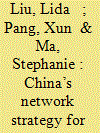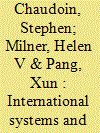| Srl | Item |
| 1 |
ID:
152312


|
|
|
|
|
| Summary/Abstract |
Existing scholarship on the rise of China and Chinese foreign policy has largely neglected to explain one puzzling phenomenon—although China’s network position in the global economic system has become more similar to that of developed countries, China continues to set its foreign policy from the perspective of a developing country. By analysing the relationship between the environmental possibilities and China’s intentional strategy, this article argues that the sharp contrast between China’s positions in the international political and economic systems reflects China’s ‘network strategy of embedded rise’. There are two mechanisms that go in opposite directions and jointly determine China’s foreign policy location in the international political spectrum. The first, called the ‘structural alienation effect’, is that wherein divergence in the centre-periphery positions in the global economic network increases the heterogeneity of two countries’ preferences, attitudes, and incentives, and in turn weakens alignment of their foreign policies. However, this structural effect is moderated by the second mechanism, namely, the ‘strategic affinity effect’. China’s strategy of assuming the role of a ‘broker’ to connect developing countries at the periphery of the international political and economic networks with developed countries at the centre achieves high ‘betweenness’ centrality, and so increases its social capital and influence in international politics. This article tests the proposed theory of China’s network strategy of embedded rise through hierarchical models that use global trade network centrality data and the United Nations General Assembly (UNGA) votes of 161 developing countries from 1994 to 2012. Our findings show that the globalized world both constrains and enables China’s great power status.
|
|
|
|
|
|
|
|
|
|
|
|
|
|
|
|
| 2 |
ID:
139797


|
|
|
|
|
| Summary/Abstract |
Following older debates in international relations literature concerning the relative importance of domestic versus systemic factors, newer debates emphasize interdependence among states and the complex interactions between systemic and domestic factors. As globalization and democratization advance, theories and empirical models of international politics have become more complicated. We present a systematic theoretical categorization of relationships between domestic and systemic variables. We use this categorization so that scholars can match their theory to the appropriate empirical model and assess the degree to which systemic factors affect their arguments. We also present two advances at the frontier of these empirical models. In one, we combine hierarchical models of moderating relationships with spatial models of interdependence among units within a system. In the other, we provide a model for analyzing spatial interdependence that varies over time. This enables us to examine how the level of interdependence among units has evolved. We illustrate our categorization and new models by revisiting the recent international political economy (IPE) debate over the relationship between trade policy and regime type in developing countries.
|
|
|
|
|
|
|
|
|
|
|
|
|
|
|
|